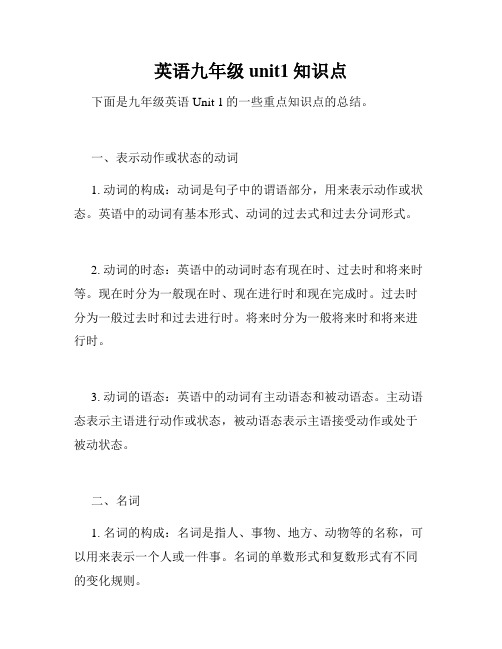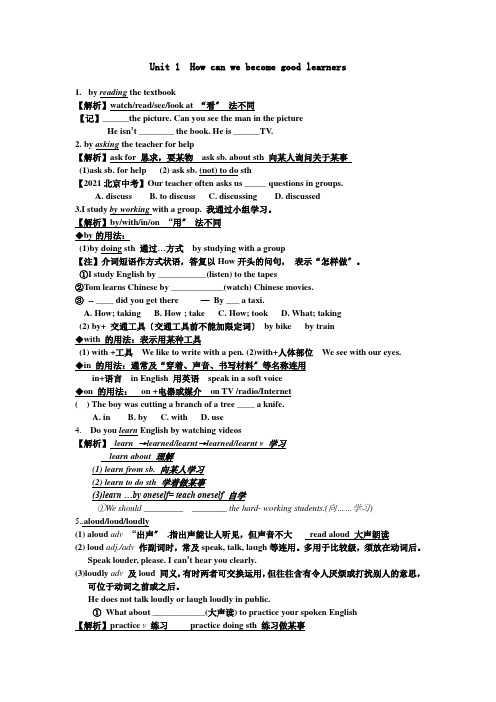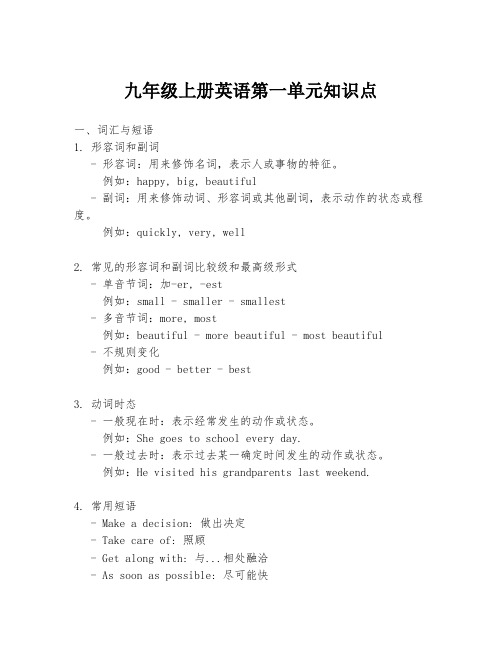新课标九年级上学期英语第一单元知识点
九年级英语上册第一单元知识点

九年级英语上册第一单元知识点Unit 1 How can we become good learners? 短语总结:1.have conversation with sb.同某人谈话2.too…to…太……而不能3.the secret to………的秘诀4.be afraid of doing sth./be afraid to dosth.害怕做某事5.look up查阅6.make mistakes in在……方面犯错误7.connect……with…把…和…连接/联系起来8.get bored感到厌烦9.be stressed out焦虑不安的10.pay attention to注意;关注11.depend on取决于;依靠12.the ability to do sth..做某事的能力二.用法集萃1.by doing sth通过做某事2.it+be+adj+to do sth做某事是……的3.finish doing sth完成某事4.what about doing sth?做某事怎么样?5.try to do sth尽力做某事6.the+比较近,the+比较近越……,就越……7.find it+adj+to do sth发现做某事8.be afraid of doing sth害怕做某事9.help sb(to)do sth帮助某人做某事10.practice doing sth练习做某事11.keep doing sth一直做某事12.be afraid to do sth害怕做某事13.begin to do sth开始做某事14.want to do sth想要做某事15.need to do sth需要做某事16.remember to do sth记得做某事17.shoot射(射着,射死等表结果)18.shoot at(瞄准)射。
英语九年级unit1知识点

英语九年级unit1知识点下面是九年级英语Unit 1的一些重点知识点的总结。
一、表示动作或状态的动词1. 动词的构成:动词是句子中的谓语部分,用来表示动作或状态。
英语中的动词有基本形式、动词的过去式和过去分词形式。
2. 动词的时态:英语中的动词时态有现在时、过去时和将来时等。
现在时分为一般现在时、现在进行时和现在完成时。
过去时分为一般过去时和过去进行时。
将来时分为一般将来时和将来进行时。
3. 动词的语态:英语中的动词有主动语态和被动语态。
主动语态表示主语进行动作或状态,被动语态表示主语接受动作或处于被动状态。
二、名词1. 名词的构成:名词是指人、事物、地方、动物等的名称,可以用来表示一个人或一件事。
名词的单数形式和复数形式有不同的变化规则。
2. 可数名词和不可数名词:可数名词可以用数词或冠词来修饰;不可数名词通常不能与数词连用,只能用量词来表示。
三、形容词和副词1. 形容词的构成:形容词是用来表示事物性质或状态的词汇,可以修饰名词或代词。
2. 副词的构成:副词是用来修饰动词、形容词或其他副词的词汇,用来表达程度、方式或时间。
大部分副词是通过在形容词后面加上-ly构成。
四、代词1. 人称代词:人称代词分为主格和宾格两种形式。
主格代词作主语,宾格代词作宾语。
2. 物主代词:物主代词用来表示所属关系,包括形容词性物主代词和名词性物主代词。
3. 反身代词:反身代词用作宾语,表示某人自己做某事。
五、冠词和介词1. 冠词的用法:冠词分为定冠词和不定冠词,用来限定名词。
定冠词有the,不定冠词有a和an。
2. 介词的用法:介词用来表示名词或代词与其他单词之间的关系,常用于表示时间、地点、方向、目的等。
六、连接词和从句1. 连接词的分类:连接词分为并列连词、关系连词和从属连词。
并列连词用来连接两个相同的成分,关系连词用来引导定语从句,从属连词用来引导时间、条件、原因、目的、方式、结果等从句。
2. 从句的种类:从句分为名词性从句、定语从句和状语从句。
九上英语unit1知识点总结

九上unit1知识点总结一、重点短语:1、eat up 吃完,吃光2、be curious about 对…感到好奇3、keep…in order 使…保持井然有序4、show off 炫耀5、come up with 想出(主意)6、n either…nor… 既不…也不…7、impress sb with sth 用…给某人留下印象8、win high praise 赢得高度赞扬9、sales department 销售部10、general manager总经理11、in general 总的来说12、e ither…or… 不是…就是… 13、take the lead 处于领先地位14、fall behind 落后15、take on new challenges迎接新的挑战16、chief engineer总工程师17、the high-speed railway高铁18、connect to/with与…连接19、as good as 和…几乎一样简直是20、pay attention to 注意21、work to high standards以高标准工作22、a pioneer heart surgeon 心脏外科先锋23、work extra hours 加班几个小时24、be suitable for… 适合于…25、b e impatient with… 对…没有耐心26、think twice(about sth) 三思而行27、do the dishes 洗碗28、lunar calendar 阴历,农历29、animal sign 生肖30、in all 总共,总计31、star sign 星座32、d ivide…into… 把…分成…33、make a speech 发表演讲34、be absent from… 缺席…35、agree with sb/ agree to do sth 同意某人看法/ 同意做某事36、all day long 一整天37、search for 搜寻38、be easy to work with容易共事39、can’t be too…再…也不为过40、n ot only…but (also)…不仅…而且…41、I t is said that… 据说42、t hat’s not the case事实并非如此二、重要用法总结:1、create (v.)创造-----creative(adj.) 有创造力的energy(n.)能量、能源-----energetic(adj.)精力充沛的organize (v.)组织---organized (adj.)有条理的--organization (n.)组织born (adj.) 天生的-----birth (n.) 出生careful (adj.)细心的-----careless (adj.)粗心-----carelessness (n.)粗心patient(adj.)有耐心的-----(反义词)impatient没有耐心的2、pay attention to doing sth 注意做某事3、devot sth to sth/doing sth 把…贡献于…/致力于做某事4、without doing sth 没有做某事5、give up doing sth 放弃做某事6、start/begin to do sth , start/begin doing sth 开始做某事7、be ready to do sth准备做某事be willing to do sth 乐意做某事8、can’t afford to do sth负担不起做某事三、重点语法:1、并列连词and 、but 、or、so①and表示并列关系,译为“和,又”(在否定句中并列成分通常用or连接,而不用and)②but表示转折关系,译为“但是”,所连接的成分意思往往相反或相对。
九年级英语上册各单元知识点归纳

九年级英语上册各单元知识点归纳第一单元:基础知识1. 介词短语的使用:介词短语是由一个介词和它的宾语组成的短语,用来表示时间、地点、方向、原因等。
例如:"on the table"(在桌子上),"in the park"(在公园里)。
介词短语在句子中作状语、定语、宾语等。
需要注意介词与宾语之间的搭配。
2. 动词的时态和语态:英语中的动词有多种时态和语态。
常见的时态有一般现在时、一般过去时、一般将来时等。
常见的语态有主动语态和被动语态。
时态用于表示动作发生的时间,语态用于表示动作的执行者。
例如:"She is reading a book."(她正在读一本书)。
需要注意时态和语态的用法和变化规则。
3. 名词的单复数形式:英语中的名词有单数和复数形式。
复数形式一般是在名词后面加-s或-es。
有些名词的复数形式较特殊,需要记忆。
例如:"a cat"(一只猫)的复数形式是"cats"(多只猫)。
需要注意名词的单复数形式在句子中的搭配和用法。
第二单元:阅读理解1. 完型填空:完型填空是一种考察学生对语境理解和词汇运用能力的题型。
在完型填空中,通常给出一篇文章和一些空格,要求学生根据文章内容和语境选择正确的单词或短语填入空格中。
通常需要结合文章整体逻辑和上下文意义来填写正确答案。
2. 阅读理解题:阅读理解题是一种考察学生阅读理解能力和推理能力的题型。
通常会给出一篇短文或文章,然后根据文章内容提出一些问题,要求学生根据文章内容和推理来回答问题。
需要学会熟练阅读和理解文章,抓住关键信息和主题,并能运用推理等能力来回答问题。
第三单元:语法知识1. 直接引语和间接引语:在英语中,当我们引述别人的话时,可以使用直接引语和间接引语。
直接引语是直接引用别人所说的话,使用引号将其包围;间接引语是将别人所说的话转述出来。
例如:直接引语:"I am happy," she said.(她说:“我很开心。
新目标英语九年级上册第一单元的知识点整理

新目标英语九年级上册第一单元的知识点整理1.alud adv.出声地(使别人能听得到)Reading alud is a gd wa in leaning English.朗读是学英语的一个好方法。
▲lud ad. 大声的,声音洪亮的,lud—luder—ludestHe taled in a lud vice s that everne culd hear hi.他说话声音很大以便于每个人都能听得到他。
▲adv. lud—luder—ludestDn’t tal s lud.The ids are reading.说话小声些,孩子们正在看书。
(Spea)luder,please!请再说高一些!▲ludl adv吵吵闹闹地,噪声地I heard sene nced ludl at the dr.我听到有人在使劲敲门。
The are taling ludl in the next r.他们在隔壁说话声很大。
2.vice n.噪音,鸟鸣声She has a sweet vice.她声音很甜美。
She raised her vice s that she culd be heard.她提高了嗓音队便于别人能听清楚。
He lst his vice./He had n vice because f the cugh.因为咳嗽,他失声了。
▲nise n噪音,吵闹Dn’t ae s uch nise.别弄出那么大的噪音。
I heard a strange nise utside.我听到外边奇怪的声音。
▲sund n.(自然界中的)声音,响声Sund travels slwer than light.声音的传播比光慢。
3.er n.(计算机的)储存器A lt f infratin is stred in the er.计算机的储存器能储存很多信息。
▲n.记忆力He has a pr er after the car accident.车祸后他的记忆力很差了。
九年级上册英语第一单元知识点

九年级上册英语第一单元知识点九年级上册的英语教材第一单元主要介绍了一些基础的语法知识和词汇,本文将对这些知识点进行详细的讲解和总结。
一、动词的时态1.一般现在时:表示经常性或习惯性的动作,结构为主语+动词原形。
例如:I often play basketball.2.一般过去时:表示过去某个时间发生的动作,结构为主语+动词的过去式。
例如:He watched a movie last night.3.一般将来时:表示将来要发生的动作,结构为主语+will+动词原形。
例如:We will go shopping tomorrow.二、名词的复数形式1.一般情况下,名词复数形式在词尾加-s。
例如:book-books,cat-cats.2.以-s、-sh、-ch、-x结尾的名词,在词尾加-es。
例如:bus-buses,brush-brushes.3.以辅音字母+y结尾的名词,变y为i,再加-es。
例如:party-parties,city-cities.4.以-o结尾的名词,有时在词尾加-es,有时只加-s。
例如:photo-photos,piano-pianos.三、形容词的比较级和最高级1.比较级的构成:原级+er。
例如:big-bigger,slow-slower.2.最高级的构成:原级+est。
例如:big-biggest,slow-slowest.3.部分形容词的比较级和最高级形式不规则,需要特殊记忆。
例如:good-better-best,bad-worse-worst.四、副词的用法副词用来修饰动词、形容词和其他副词,常放在句子的中间或末尾。
例如:She sings beautifully.一些常见的副词有:well,quickly,carefully,sometimes等。
五、连词的使用1.并列连词:用来连接并列的词或短语,常见的有and,but,or等。
例如:I like apples and oranges.2.转折连词:用来引导转折关系的句子,常见的有however,although,but等。
新目标英语九年级上第一单元知识点汇总

Unit 1 How can we become good learners1.by reading the textbook【解析】watch/read/see/look at “看〞法不同【记】______the picture. Can you see the man in the pictureHe isn’t ________ the book. He is ______TV.2.by asking the teacher for help【解析】ask for 恳求,要某物ask sb. about sth 向某人询问关于某事(1)ask sb. for help (2) ask sb. (not) to do sth【2021北京中考】Our teacher often asks us _____ questions in groups.A. discussB. to discussC. discussingD. discussed3.I study by working with a group. 我通过小组学习。
【解析】by/with/in/on “用〞法不同◆by的用法:(1)by doing sth 通过…方式by studying with a group【注】介词短语作方式状语,答复以How开头的问句,表示“怎样做〞。
①I study English by ___________(listen) to the tapes②Tom learns Chinese by ____________(watch) Chinese movies.③-- ____ did you get there —By ___ a taxi.A. How; takingB. How ; takeC. How; tookD. What; taking(2) by+ 交通工具〔交通工具前不能加限定词〕by bike by train◆with 的用法:表示用某种工具(1) with +工具We like to write with a pen. (2)with+人体部位We see with our eyes.◆in 的用法:通常及“穿着、声音、书写材料〞等名称连用in+语言in English 用英语speak in a soft voice◆on 的用法:on +电器或媒介on TV /radio/Internet( ) The boy was cutting a branch of a tree ____ a knife.A. inB. byC. withD. use4. Do you learn English by watching videos【解析】learn →learned/learnt→learned/learnt v 学习learn about 理解(1) learn from sb. 向某人学习(2) learn to do sth 学着做某事(3)learn …by oneself= teach oneself 自学①We should _________ ________ the hard- working students.(向……学习)5..aloud/loud/loudly(1) aloud adv“出声〞,指出声能让人听见,但声音不大read aloud 大声朗读(2) loud adj./adv作副词时,常及speak, talk, laugh等连用。
九年级上册英语第一单元知识点

九年级上册英语第一单元知识点随着九年级学习的深入,我们迎来了新学期的第一单元——英语。
在这个单元中,我们将会学习一些基础的语法和词汇知识,并初步掌握如何用英语进行简单的交流。
接下来,让我们一起来探索一下本单元的重点内容吧。
第一部分:基础词汇在这个单元中,我们将会学习一些日常生活中经常使用的基础词汇。
比如,我们会学习如何用英语来表达时间、家庭成员、学科等。
这些词汇的掌握对我们接下来的学习和交流都非常重要。
另外,我们还将学习一些简单的动作动词,如跑、游泳、打篮球等。
这些动词的学习将有助于我们描述自己的日常活动,提高我们在英语交流中的表达能力。
第二部分:语法知识本单元的语法知识主要围绕着现在进行时的用法展开。
现在进行时用来表达当前正在进行的动作,它的构成形式为be动词 + 现在分词。
比如,I am reading a book(我正在读一本书)。
现在进行时在我们的日常交流和写作中是非常常用的时态,因此务必要牢固掌握。
另外,在本单元中我们也会学习一些简单的时间状语从句,如when、while、as soon as等。
这些从句将有助于我们描述两个动作的时间关系,并丰富我们的句子结构。
第三部分:口语表达学好英语不仅仅是掌握语法和词汇,还需要通过口语练习来提高我们的听说能力。
在本单元中,我们将会进行一些口语对话练习,通过模仿、创造对话情境,加强我们的口语表达能力。
此外,我们还会进行一些小组活动,如角色扮演,让我们在轻松愉快的氛围中进行英语对话的练习。
这些活动将会激发我们对学习英语的兴趣,提高我们的学习效果。
总结:本单元的学习内容主要包括基础词汇、语法知识和口语表达。
通过学习这些知识点,我们将能够更好地理解和表达自己的想法,提高英语的运用能力。
同时,我们还要注意在学习中不仅要掌握知识,还要注重语言的实际运用,通过多种方式进行口语训练,提高我们自己的英语水平。
希望大家能够积极参与课堂活动,主动思考和学习,相信通过我们的共同努力,我们一定能够在九年级英语学习中取得优异的成绩!。
九年级上英语unit1知识点

九年级上英语unit1知识点Unit 1 Topics in Grade 9 EnglishIntroduction:In the first unit of Grade 9 English, students are introduced to various important topics that lay the foundation for their language learning journey. These topics range from grammar and vocabulary to reading and writing skills. Let's delve into some key knowledge points covered in this unit.1. Basic Grammar Concepts:1.1 Parts of Speech:Understanding the different parts of speech is essential for effective communication. In this unit, students learn about nouns, pronouns, verbs, adjectives, adverbs, conjunctions, and prepositions. They explore how these parts of speech function in sentences by identifying their role and usage.1.2 Verb Tenses:Verb tenses play a vital role in expressing actions and states of being. Students are introduced to the simple present, present continuous,simple past, past continuous, and future tenses. They practice constructing sentences and using appropriate verb forms for each tense.2. Vocabulary Expansion:2.1 Word Formation:Building vocabulary is crucial for language proficiency. In this unit, students learn about word formation processes like compounding, blending, abbreviations, and acronyms. They discover how these processes contribute to the creation of new words and expressions.2.2 Opposites and Synonyms:Being able to identify and use opposites and synonyms enhances students' language skills. They learn common word pairs and expressions that display opposite meanings or similar concepts. Engaging activities and exercises help reinforce the understanding of these vocabulary relationships.3. Reading Skills:3.1 Skimming and Scanning:Efficiently extracting information from texts is a valuable skill. Students learn to skim through passages to get the gist of the content and scan for specific details. These techniques assist in better understanding and quick retrieval of information.3.2 Identifying Main Ideas and Supporting Details:Understanding the main ideas and supporting details helps students comprehend texts effectively. They practice identifying the topic sentence, main points, and relevant details in passages. This skill allows them to grasp the overall message of a text and distinguish between essential and non-essential information.4. Writing Skills:4.1 Narrative Writing:Through narrative writing, students develop their ability to create engaging stories. They explore elements like characters, setting, plot, conflict, and resolution. Writing prompts and activities encourage students to structure their narratives coherently and express their creativity.4.2 Descriptive Writing:Descriptive writing enables students to vividly portray people, places, or objects in their writing. They learn to incorporate sensory details, figurative language, and precise vocabulary to create a vivid picture in the reader's mind.Conclusion:The first unit of Grade 9 English encompasses essential knowledge points that provide a solid foundation for further language learning. From understanding grammar concepts and expanding vocabulary to developing reading and writing skills, students acquire the necessary tools to enhance their English proficiency. With continued practice and application of these knowledge points, students will confidently navigate through their English language journey.。
九年级上册英语unit1知识点归纳

九年级上册英语unit1知识点归纳九年级上册英语Unit 1 知识点归纳英语学习是九年级上册的重要内容之一。
Unit 1是我们所学知识点的首个单元,本文将对该单元的重要知识进行归纳和总结。
通过本文的阅读,希望能够帮助大家更好地掌握相关知识,提高英语学习的效果。
一、被动语态被动语态是英语中重要的语法结构之一。
在Unit 1中,我们学习了被动语态的用法和构成。
被动语态由助动词“be”加上动词的过去分词构成。
例如:Active: The boy broke the window.Passive: The window was broken by the boy.需要注意的是,在被动语态中,谓语动词的时态要根据句子的主语来确定。
“be”的形式可以根据句子的时态和人称的不同进行变化。
同时,被动语态常常用于强调动作的承受者,或者当我们不知道或不关心动作的执行者时。
二、情态动词情态动词在英语中有着特殊的用法和含义。
Unit 1中,我们学习了情态动词的用法和常见的几个情态动词,如can, could, may, might等等。
情态动词具有以下几个特点:1. 不具备人称和数的变化。
即情态动词在句子中不需要根据主语的不同来进行变化。
2. 情态动词后面接动词原形,不加任何词尾。
3. 情态动词本身已经具备了很强的意义,所以在句子中往往只需要一个情态动词,不需要再加其他的助动词。
情态动词的具体用法和含义需要根据上下文来进行理解和把握。
例如:Can I go to the party?(表示请求)He could speak three foreign languages when he was ten.(表示能力)May I help you?(表示许可)You might pass the exam if you work hard.(表示可能性)三、虚拟语气虚拟语气是英语语法中的一种特殊形式。
在Unit 1中,我们学习了虚拟语气的用法和构成。
九年级英语上Unit1知识点归纳

九年级英语上Unit1知识点归纳Unit 1 How can we e good learners?课文知识点解析by+doing形式”表示方式、方法by+doing形式”表示通过做某事的方式或方法。
例如:I learn XXX 通常用来回答How do you。
或How can I。
这类句型。
例如:How can I turn on the light。
By turning this button.拓展:介词by的其他用法:1.XXX交通工具,“乘/坐。
”例如:by bus2.by+地点,“在。
的旁边;靠近。
”例如:by XXX3.by+时间,“截止到。
不迟于。
”例如:XXX4.辨析by、with、in,“用”by:侧重“用”某种手段、交通工具、传递方式或媒介等with:侧重“用”有形工具、材料、内容等in:侧重“用”语言、语调、笔墨、颜色等例如:XXX.n A1.通过向老师求助,来提高研究效果。
(P1)使用“by+动名词/名词/代词”表示通过某种方式或方法。
例如:by hand。
ask(sb)for sth表示“向某人要某物;要求某人某事”。
2.你是否用英语与朋友交谈?(P2)XXX表示“交谈;谈话”。
与动词have/hold连用时,须加不定冠词,但与动词make连用时,不加不定冠词。
常用短语有:have/hold XXX。
“与。
交谈/谈话”;make n“闲谈;搭讪”;XXX。
“与。
在谈话”。
XXX reading aloud。
Reading aloud is different from reading loudly。
as it means reading in a way that others can hear you。
It can be a helpful way to XXX。
Some people find it too hard to understand spoken English。
九年级上册unit1知识点

九年级上册unit1知识点Unit 1: School Life本单元主要介绍了关于学校生活的各种事物和情境,以下是该单元的重点知识点:1. School FacilitiesIn this unit, we will discuss various school facilities. These include classrooms, libraries, laboratories, sports facilities, and computer rooms. Each of these places serves a different purpose and contributes to awell-rounded education. For example, classrooms are where students receive their lessons and engage in discussions, while libraries provide a quiet space for studying and conducting research.2. Subjects and LessonsAnother essential aspect of school life is the subjects and lessons we study. Throughout the unit, we will explore different subjects such as math, science, history, and English. Each subject has its own importance and offers unique skills and knowledge. Students learn these subjects through lessons conducted by their teachers, who provide guidance and facilitate learning.3. School Events and ActivitiesApart from academic studies, school life also involves various events and activities that promote social interaction and personal growth. These include field trips, sports events, school clubs, and extracurricular activities. Field trips allow students to explore the world outside the classroom, while sports events encourage teamwork and physical fitness. Participation in school clubs and extracurricular activities help students develop their interests and talents.4. School Rules and RegulationsEvery school has its own set of rules and regulations to ensure a safe and conducive learning environment for all students. These rules often cover areas such as uniform policies, punctuality, behavior expectations, and academic integrity. Students are expected to adhere to these rules and understand the consequences of breaking them. Following school rules fosters discipline and creates a positive atmosphere.5. Study SkillsA crucial part of succeeding in school is mastering effective study skills. Students need to learn techniques such as note-taking, time management, and reviewing. These skills help organize informationand enhance retention. Additionally, developing good study habits, such as setting goals and staying focused, greatly contribute to academic achievement.6. Tests and AssessmentsThroughout the school year, students are regularly assessed through tests, quizzes, and examinations. These evaluations measure their understanding and progress in different subjects. Students need to prepare adequately by revising their lessons, practicing sample questions, and seeking clarification from their teachers. Understanding different assessment methods and strategies can help improve performance.7. Teacher-Student RelationshipThe relationship between teachers and students plays a vital role in creating a positive and supportive learning environment. Teachers are responsible for guiding students' learning, providing feedback, and encouraging their personal growth. Building strong teacher-student relationships promotes effective communication, trust, and collaboration.8. School Transition and ChallengesThe transition from lower grades to middle school can present challenges for students. Adjusting to a new school environment, making new friends, and managing increased academic demands can be stressful. However, students can overcome these challenges by seeking support from teachers, developing good study habits, and actively participating in school activities.以上是九年级上册unit1的知识点总结。
九年级英语第一单元知识点归纳总结

九年级英语第一单元知识点归纳总结一、重点词汇1、 textbook n 教科书;课本2、 conversation n 交谈;谈话3、 aloud adv 大声地;出声地4、 pronunciation n 发音;读音5、 sentence n 句子6、 patient adj 有耐心的 n 病人7、 expression n 表情;表示;表达方式8、 discover v 发现;发觉9、 secret n 秘密;秘诀 adj 秘密的;保密的10、 grammar n 语法11、 repeat v 重复;重做12、 note n 笔记;记录 v 注意;指出13、 pal n 朋友;伙伴14、 physics n 物理;物理学15、 chemistry n 化学二、重点短语1、 work with friends 和朋友一起学习2、 make word cards 制作单词卡片3、 read aloud 大声朗读4、 practice conversations with 与练习对话5、 improve speaking skills 提高口语技能6、 give a report 作报告7、 at first 起初;起先8、 word by word 逐词地9、 be patient 有耐心10、 the secret to 的秘诀11、 because of 因为12、 fall in love with 爱上13、 look up 查阅;抬头看14、 take notes 做笔记15、 keep a diary 写日记三、重点句型1、 How do you study for a test? 你是怎样为考试而学习的?2、 I study by working with a group 我通过小组合作来学习。
3、 It's too hard to understand spoken English 英语口语太难懂了。
九年级上册英语第一单元知识点

九年级上册英语第一单元知识点第一单元是九年级上册英语的开篇单元,主要介绍了一些基础的英语知识点。
下面是对该单元的知识点进行详细解析。
1. 重点词汇和短语在这一单元中,我们需要掌握一些重要的词汇和短语。
例如:- greet:问候- introduce:介绍- classmate:同学- subject:科目- foreign:外国的- born:出生- age:年龄- nationality:国籍- speak:说话- speak English:说英语- surprise:惊讶- lucky:幸运的- guess:猜这些词汇和短语在日常英语中经常使用,掌握它们有助于提高我们的英语交流能力。
2. 问候和自我介绍这一单元还涉及到如何进行问候和自我介绍。
例如,我们学习了一些常用的问候语,如:- How are you?:你好吗?- Good morning/afternoon/evening:早上/下午/晚上好- Nice to meet you:很高兴见到你在自我介绍方面,我们需要能够介绍自己的名字、年龄、国籍等信息。
例如:- My name is Tom.:我的名字叫汤姆。
- I'm thirteen years old.:我今年十三岁。
- I'm from China.:我来自中国。
通过学习这些知识点,我们可以在日常生活中更加自如地与他人交流。
3. 数字和年龄在这一单元中,我们还需要掌握数字和年龄的表达方式。
例如,我们需要学习1-20的英文表达形式:- one:一- two:二- three:三- ...- twenty:二十此外,我们还需要学会询问他人的年龄以及回答这个问题。
例如:- How old are you?:你几岁了?- I'm fifteen years old.:我十五岁。
数字和年龄是我们生活中经常用到的概念,掌握它们对我们的英语学习非常重要。
4. 国籍和语言在这个单元,我们还学习了如何询问他人的国籍以及使用的语言。
新目标人教版九年级英语上册Unit1全单元知识点归纳

Unit 1 How can we become good learners?课文知识点解析“by+doing 形式”表示方式、方法拓展:介词by 的其他用法:1)by+交通工具,“乘/坐...” by bus2)by+地点,“在...的旁边;靠近...” by the lake3)by+时间,“截止到...;不迟于...” by ten4)辨析by 、with 、in ,“用”Eg. We ’ll be traveling by car.He broke the window with a stone.Please answer the question in English.即学即练:1.-How do you learn English words? -_____making word cards.A. ToB. ByC. ForD. With2.-How do you get to school every day. Lucy? -I go to school _____.A.ride my bikeB.by my bikeC.by busD.by a bus3.Mr.Scott made a living by____(sell) old things.4.She learns English by listening to tapes.(对划线部分提问)_____ ______ she learn English?5.Most of them take the train to work.(改为同义句)Most of them go to work ______ ______.要点详解:Section A1.by asking the teacher for help通过向老师求助。
(P1) 1)by,“通过;靠”,后加名词/代词/动名词。
Eg. He had to do all the work by hand.2)ask (sb) for sth,“向某人要某物;要求某人某事”。
英语九年级上第一单知识点

英语九年级上第一单知识点英语九年级上第一单元知识点第一部分:词汇英语九年级上册第一单元主要涉及以下一些重要的词汇。
首先是一些基础的动词,如"go"(去),"come"(来),"eat"(吃),"drink"(喝)等。
这些动词在日常生活中十分常见,我们使用它们来表达我们的行动。
此外,形容词也是本单元的重点。
我们学习了一些形容词,如"happy"(高兴的),"sad"(悲伤的),"tall"(高的),"short"(矮的)等。
形容词用来描述人或物的特征或状态,让我们的语言更加生动有趣。
第二部分:语法英语九年级上册第一单元的语法重点主要是一般现在时。
一般现在时表示经常性或普遍性的动作、状态或习惯。
我们可以使用一般现在时来描述我们的日常活动,比如"she goes to school every day"(她每天上学)。
一般现在时还可以用来表达客观事实,比如"the sun rises in the east"(太阳从东方升起)。
此外,一般现在时还可用来表达感觉,看法和意愿。
例如"I like dogs"(我喜欢狗)。
在一般现在时的陈述句中,第三人称单数动词的变化规则是在动词原形后面加上“-s”,比如"she likes ice cream"(她喜欢冰淇淋)。
第三部分:口语表达九年级上册第一单元的课堂活动为我们提供了一些实践英语口语表达的机会。
通过与同学们交流,我们可以提高我们的口语表达能力。
我们可以用英语问候别人,如"Hi, how are you?"(你好,你好吗?)。
当别人问候我们时,我们可以回答"Fine, thank you. Andyou?"(我很好,谢谢你。
九年级上册英语第一单元知识点

九年级上册英语第一单元知识点一、词汇与短语1. 形容词和副词- 形容词:用来修饰名词,表示人或事物的特征。
例如:happy, big, beautiful- 副词:用来修饰动词、形容词或其他副词,表示动作的状态或程度。
例如:quickly, very, well2. 常见的形容词和副词比较级和最高级形式- 单音节词:加-er, -est例如:small - smaller - smallest- 多音节词:more, most例如:beautiful - more beautiful - most beautiful- 不规则变化例如:good - better - best3. 动词时态- 一般现在时:表示经常发生的动作或状态。
例如:She goes to school every day.- 一般过去时:表示过去某一确定时间发生的动作或状态。
例如:He visited his grandparents last weekend.4. 常用短语- Make a decision: 做出决定- Take care of: 照顾- Get along with: 与...相处融洽- As soon as possible: 尽可能快二、语法点1. 比较级和最高级的构成- 规则变化:形容词和副词的比较级和最高级通常是通过在词尾加上-er和-est构成。
- 不规则变化:一些形容词和副词的比较级和最高级形式是不规则的,需要特别记忆。
- 双重比较级:使用more和less来构成比较级和最高级,适用于多音节和一些单音节形容词。
2. 比较级和最高级的用法- 比较级用于比较两者之间的差别。
例如:My sister is taller than me.- 最高级用于比较三者或三者以上的人或事物。
例如:Tom is the tallest student in our class.3. 时态的使用- 一般现在时通常用于描述习惯性动作或普遍真理。
(完整版)九年级英语上册第一单元知识点总结

九年级英语上册第一单元知识点总结九年级英语上册第一单元知识点总结Unit 1一、知识点: 在旅馆的登记入住。
ut: 在旅馆结账离开。
2.By: ①通过…..方式(途径)。
例:I learn English by listening to tapes.②在…..旁边。
例:by the window/the door③乘坐交通工具例:by bus/car④在……之前,到……为止。
例:by October在10月前⑤被例:Englby many people.3.how与what的区别:how通常对方式或程度提问,意思有:怎么样如何,通常用来做状语、表语。
what通常对动作的发出者或接受者提问,意思为什么,通常做宾语,主语。
①How is your summer holiday? It’s OK.(how表示程度做表语)②How did you travel around the world? I travel by air.③What do you learn at school? I learn English, math and maubjects.① What……? How…like…?② What…do with…? How…deal with…?③ What…like about…? How…like…?④ What’s the weather like today? How’s the weather today?⑤ What to do? How to do it?e.g. What do youbook?=How do you lbook?I don’t know what I should do watter.=I don’t know how I should deal wWhat do you like about China?=How do you la?I don’t know what to do next step?=I don’t know how to do it next step?㊣ What good / bad weaday!(weather为不可数名词,其前不能加 a )㊣ What a fine / bad daday! (day为可数名词,其前要加 a )4. aloud, loud与loudly的用法 : 三个词都与"大声"或"响亮"有关。
- 1、下载文档前请自行甄别文档内容的完整性,平台不提供额外的编辑、内容补充、找答案等附加服务。
- 2、"仅部分预览"的文档,不可在线预览部分如存在完整性等问题,可反馈申请退款(可完整预览的文档不适用该条件!)。
- 3、如文档侵犯您的权益,请联系客服反馈,我们会尽快为您处理(人工客服工作时间:9:00-18:30)。
新课标九年级上学期英语第一单元知识点TTA standardization office【TTA 5AB- TTAK 08- TTA 2C】U n i t 1 1. by + doing通过……方式如:by studying with a groupby 还可以表示:“在…旁”、“靠近”、“在…期间”、“用、”“经过”、“乘车”等如:I live by the river. I have to go back by ten o’clock.The thief entered the room by the window.The student went to park by bus.2. talk about 谈论,议论,讨论如:The students often talk about movie after class. 学生们常常在课后讨论电影。
talk to sb. === talk with sb. 与某人说话3. 提建议的句子:①What/ how about +doing sth.如:What/ How about going shopping②Why don’t you + do sth.如:Why don’t you go shopping?③Why not + do sth.如:Why not go shopping④Let’s + do sth. 如: Let’s go shopping⑤Shall we/ I + do sth.如:Shall we/ I go shopping?4. a lot 许多常用于句末如:I eat a lot. 我吃了许多。
5. too…to 太…而不能常用的句型too+adj./adv. + to do sth.如:I’m too tired to say anything. 我太累了,什么都不想说。
6. aloud, loud与loudly的用法三个词都与"大声"或"响亮"有关。
①aloud是副词,重点在出声能让人听见,但声音不一定很大,常用在读书或说话上。
通常放在动词之后。
aloud没有比较级形式。
如: He read the story aloud to his son.他朗读那篇故事给他儿子听。
②loud可作形容词或副词。
用作副词时,常与speak, talk,laugh等动词连用,多用于比较级,须放在动词之后。
如:She told us to speak a little louder. 她让我们说大声一点。
③loudly是副词,与loud同义,有时两者可替换使用,但往往含有令人讨厌或打扰别人的意思,可位于动词之前或之后。
如:He does not talk loudly or laugh loudly in public. 他不当众大声谈笑。
7. not …at all 一点也不根本不如:I like milk very much. I do n’t like coffee at all. 我非常喜欢牛奶。
我一点也不喜欢咖啡。
not经常可以和助动词结合在一起,at all 则放在句尾8. be / get excited about sth.=== be / get excited about doing sth.=== be excited to do sth. 对…感兴奋如:I am / get excited about going to Beijing.===I am excited to go to Beijing. 我对去北京感到兴奋。
9. ①end up doing sth 终止做某事,结束做某事如:The party ended up singing. 晚会以唱歌而结束。
②end up with sth. 以…结束如:The party ended up with her singing. 晚会以她的歌唱而告终。
10. first of all 首先. to begin with 一开始later on 后来、随也、而且(用于肯定句)常在句子的中间either也(用于否定句)常在句末too也 (用于肯定句) 常在句末12. make mistakes 犯错如:I often make mistakes. 我经常犯错。
make a mistake 犯一个错误如: I have made a mistake.我已经犯了一个错误。
13. laugh at sb. 笑话;取笑(某人)如:Don’t laugh at me!不要取笑我!14. take notes 做笔记,做记录15. enjoy doing sth .喜欢做…乐意做…如:She enjoys playing football. 她喜欢踢足球。
enjoy oneself 过得愉快如:He enjoyed himself. 他过得愉快。
16. native speaker 说本族语的人17. make up 组成、构成18. one of +(the+ 形容词比较级)+名词复数形式…其中之一如: She is one of the most popular teachers.她是最受欢迎的教师之一。
19. It’s +形容词+(for sb. ) to do sth. (对于某人来说)做某事…如:It’s difficult (for me ) to study English.对于我来说学习英语太难了。
句中的it 是形式主语,真正的主语是to study English20. practice doing 练习做某事如:She often practice speaking English. 她经常练习说英语。
21. decide to do sth. 决定做某事如:LiLei has decided to go to BeiJing . 李雷已经决定去北京。
22. unless 假如不,除非引导条件状语从句如:You will fail unless you work hard..假如你不努力你会失败。
I won’t write unless he writes first. 除非他先写要不我不写23. deal with 处理如:I dealt with a lot of problem.24. worry about sb./ sth. 担心某人/ 某事如:Mother worried about his son just now.妈妈刚才担心他的儿子。
25. be angry with sb. 对某人生气如:I was angry with her. 我对她生气。
26. perhaps === maybe 也许27. go by (时间) 过去如: Two years went by. 两年过去了。
看见某人正在做某事强调正在发生see sb. / sth. do看见某人在做某事如:如: She saw him drawing a picture in the classroom.她看见他正在教室里画画。
29. each other 彼此30. regard… as …把…看作为….如:The boys regarded Anna as a fool. 这些男孩把安娜看成傻瓜。
31. too many许多修饰可数名词如:too many girlstoo much许多修饰不可数名词如:too much milkmuch too太修饰形容词如:much too beautiful32. change…into…将…变为…如:The magician changed the pen into a book.这个魔术师将这本书变为一本书。
33. with the help of sb. == with one’s help 在某人的帮助下如:with the help of LiLei == with LiLei’s help在李雷的帮助下34. compare … to …把…与…相比如:Compare you to Anna, you are lucky.你和安娜相比,你是幸运的。
instead of sth. / doing sth. 代替,而不是用在句中,动词如:Last summer I went to Beijing. This year I’m going to Shanghai instead.去年夏天我去北京, 今年我将要去上海。
I will go instead of you. 我将代替你去。
He stayed at home instead of going swimming.他呆在家里而不是去游泳。
答案一.词组翻译(30分)1. make mistakes2. end up3. not at all4. later on5. be afraid to6. laugh at7. take notes 8. look up 9. make up10. deal with 11. be angry with 12. go by13. try one’s best 14. break off 15. it doesn’t matter 二.单项选择(10分)1---5 A C B A C 6—10 B B A A C三.完形填空(10分)1—5 A C A B C 6—10 B B C C A四.阅读理解(20分)1----5 F T T T F 1---5 B C B C B五.根据中文完成句子(10分)1. asks about2. way to by3. listening to tapes4. end up speaking。
